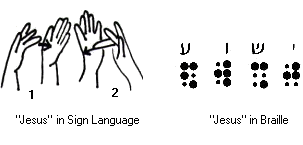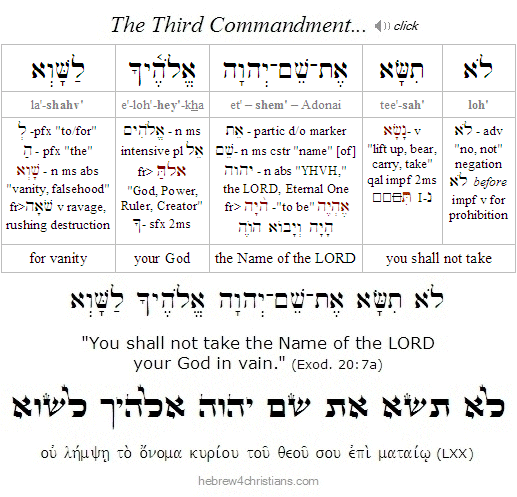|
|
|||||||||||||||||||||
 |
|||||||||||||||||||||
|
Learn Hebrew |
|||||||||||||||||||||
|
|
||||||||||||||||||||||||||||
|
Soren Kierkegaard tells the story of two young portrait artists who both sought to capture the essence of beauty in their paintings. One artist looked high and low for the "perfect face of beauty" but never found it. Tragically, he later gave up painting and lived in despair. The other artist, however, simply painted every face he saw and found beauty in each one. Now here's your question: Which of the two was the sincere artist? To the disciples' delight the Master said he wanted a new shirt for his birthday. The finest cloth was bought. The village tailor came in to have the Master measured, and promised, by the will of God to make the shirt within a week. A week went by and a disciple was dispatched to the tailor while the Master excitedly waited for his shirt. Said the tailor: "There has been a slight delay, but, by the will of God, it will be ready by tomorrow." Next day the tailor said, "I'm sorry it isn't done. Try again tomorrow and, if God so wills, it will certainly be ready." The following day the Master said. "Ask him how long it will take if he keeps God out of it." - De Mello
When we bless others we are exercising our likeness to God ("lifting up the name"), but when we curse others, we do the opposite. "Life and death are in the power of the tongue" (Prov. 18:21). The false prophet Balaam (bil'am) was named "swallowing the people" (ūóųĘūØ + ūæų╝ųČū£ųĘūó) by his mother. How strange, and yet some people apparently want to give birth to "charmers," to occultic seers -- even to "homicide bombers" and those whose life's mission is to curse people... Moses was given his name by an Egyptian princess who adopted him (the Egyptian root appears in the names Ahmoses, Ramsees, etc.), but God overruled her linguistic intent by having the child "draw the people of out" of Egypt. Balaam's mouth was likewise overruled when he sought to curse the children of Israel. The LORD took hold of his tongue and made this "donkey" of a man speak words of truth.... Following Kierkegaard's lead, let's consider the knowledge of the Name of God (i.e., the use of our religious language) from a different perspective. Kierkegaard notes that we can "know" things in different ways. What he calls "the way of objectivity" concerns itself with what is reflected upon. In the case of religious language, the concern would be whether this form of language, this word, this utterance, "represents" the true God. Knowing the Name of God "objectively," then, is about truth, power, invocation, etc. To the objectivist, knowing the Name is about Hebrew letters, about sounds, about symbols, and ultimately about obtaining some kind of spiritual power... On the other hand, what Kierkegaard calls "the way of subjectivity" concerns the "how" or "mode" in which our language relates to God. Only when we use language relating to God in a "God-relation," that is, in worship, humility, and abandonment to the glory of God, do we properly "speak" the Name of the LORD. Here's how he once put this idea: If someone lives in the midst of Christianity and enters, with knowledge of the true idea of God, into the house of God, the house of the true God, and prays, but prays in untruth, and if someone else lives in an idolatrous land but prays with all the passion of infinity, although his eyes are resting upon the image of an idol - where, then, is there more truth? The one prays in truth to God although he is worshipping an idol; the other prays in untruth to the true God and is therefore in truth worshipping an idol. The point here is simple. God is not as concerned about your "orthodox terminology" as much as he is looking for you to passionately and truly seek His face. The service of your lips must be accompanied with genuine service of the heart, lest the Name be used "lashav" - in vain... The same can be said about invoking the Name of God. God is not a snob. He doesn't get offended if someone might "lisp" His Name or tangle up their words when they call upon Him... God looks at the heart and to see if the soul truly wants His Holy Presence. As the prophet said, "You will seek me and find me, when you seek me with all your heart, and I will be found by you, declares the LORD" (Jer. 29:13-14). A debate raged among the disciples as to which was the most difficult task of all: To know how to pronounce the sacred Name of God (YHVH) revealed in the Torah, to understand the secrets of the Spirit to attain spiritual insight and power, or to properly explain the essence of God to others so they might understand it. Said the Master, when asked his opinion, "I know of a more difficult task than any of those three." "What is it?" they asked. "Trying to get you blockheads to see reality as it is."
Knowing the Name of the LORD means being in a personal, vital, and all-important relationship with the truth. The Holy Spirit is called the Spirit of Truth (ū©ūĢų╝ūŚųĘ ūöųĖūÉų▒ū×ųČū¬). This means understanding God's character as "merciful and gracious, slow to anger, and abounding in steadfast love and faithfulness, extending kindness to the thousandth generation, forgiving iniquity, transgression, and sin" (Exod. 34:6-7). Since the Hebrew idea of word (ūōų╝ųĖūæųĖū©) is coextensive with truth (i.e., "thing"), Yeshua is called the Word of God (ūōų╝ų░ūæųĘū© ūÉų▒ū£ūöų┤ūÖūØ) who represents the Name of God to all who trust in Him (John 17:26, Heb. 1:3). Jesus (Yeshua) is the Name of God, the "thing" of God, the "substance" of God, the "exact imprint and representation of His nature," and so on. "His eyes are like a flame of fire, and on his head are many diadems, and he has a name written that no one knows but himself. He is clothed in a robe dipped in blood, As a final note, I am NOT suggesting that it is unimportant to study Hebrew and learn the Hebrew Names and Titles of God! We should always strive to apprehend the revelation of the Scriptures as clearly as possible, and we must "translate" the source text into our own target language. My point here is simply not to "miss the forest for the trees." There is a deeper message from God regarding His Name that transcends morphology, phonetics, linguistics, etc. "God is love" (ßĮü ╬Ė╬ĄßĮĖŽé ß╝Ć╬│ßĮ▒ŽĆ╬Ę ß╝ÉŽāŽäßĮĘ╬Į); "God is Light" (ßĮü ╬Ė╬ĄßĮĖŽé Žåß┐ČŽé ß╝ÉŽāŽä╬╣╬Į), "God is Spirit" (ßĮü ╬Ė╬ĄßĮ╣Žé ŽĆ╬Į╬Ąß┐”╬╝╬▒ ß╝ÉŽāŽäßĮĘ╬Į); "God is goodness" (ßĮü ╬Ė╬ĄßĮ╣Žé ß╝Ć╬│╬▒╬ĖßĮĖŽé ß╝ÉŽāŽäßĮĘ╬Į), etc. There is a big difference between knowing about God and knowing Him personally, in living relationship... Shalom, chaverim.
May God give you a heart to seek and find Him today....
|
|
Hebrew for Christians |
|||||
|
|||||




